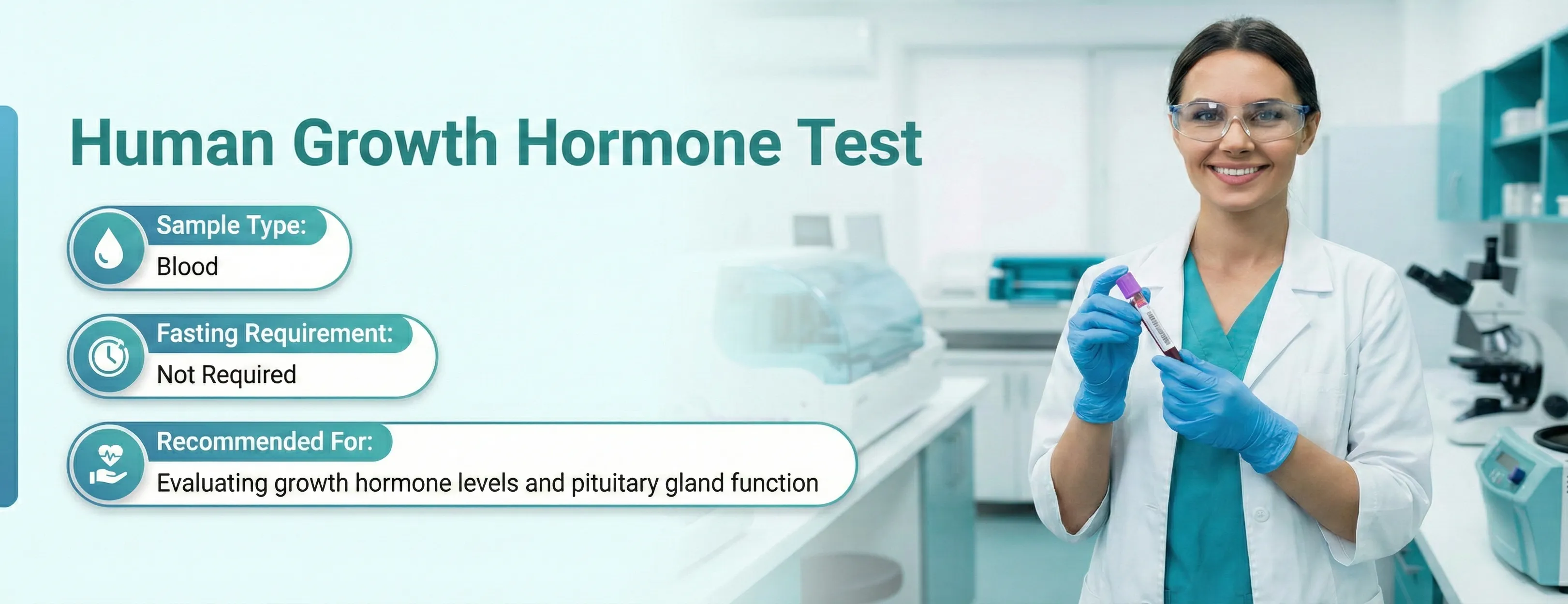28+ orders placed in your location
100% NABL & ISO Certified Lab • 100% Accurate Reports
Human Growth Hormone Test
GH test, Somatropin test, Growth hormone stimulation test, Growth hormone suppression test, Human growth hormone test
- SummaryThe Human Growth Hormone Test measures the level of growth hormone in your blood, which plays a key role in growth, metabolism, and muscle development. It is used to diagnose growth disorders and hormone imbalances. The test requires a blood sample, does not involve fasting, and is suitable for all genders and age groups as advised by a doctor.Read more
- Reports Within20 HrsView Sample Report100% NABL & ISO Certified Labs
- SampleBlood
- AgeAll Age Group
- GenderMale and Female
- FastingNot Required
PharmEasy Promises
Know More About The Test
A quick info on Human Growth Hormone Test
Overview
Human growth hormone tests are used to evaluate if your body is producing an average amount of growth hormone (GH). The results of growth hormone tests can help your doctor diagnose GH deficiency, gigantism, acromegaly and other growth hormone disorders.
The pituitary gland is a pea-sized organ located in the base of the brain that produces growth hormones. GH is a substance that is responsible for your body's growth rate. It also plays a direct role in controlling metabolism, the rate at which your body uses oxygen to produce energy. Growth hormone boosts a child's growth and later helps maintain the vitality of tissue and organs throughout life.
During childhood, the growth hormone influences a child's height, bone and muscles. The levels of GH fluctuates throughout the day and is affected by physical activities. GH level rises through childhood and peaks during puberty.
The growth hormone promotes bone and cartilage development and later monitors our bodies' fat, tissue, muscles and bones during this stage. It also oversees aspects of our metabolism, such as the action of insulin over blood sugar. Adults or children with insufficient amounts of GH can face health complications.
Since GH fluctuates throughout the day, a standard blood test does not provide enough information about GH levels. Hence, growth hormone levels are assessed by measuring other substances that are related to GH production. There are different kinds of GH tests that will help your doctor identify any disorder related to the growth hormone.
Growth hormone tests are not prescribed usually. Your doctor will recommend a GH test if they suspect that the level of GH in your body is abnormal. According to their initial diagnosis, your doctor can prescribe more than one growth hormone test.
Risk Assessment
Growth hormone deficiency, Excessive production of GH, Pituitary disorder
What does this test detect?
The human growth hormone tests measure the growth hormone level present in the blood when stimulated and suppressed. The results of the human growth hormone tests help evaluate GH levels over a particular time interval.
Indications for Human Growth Hormone Test
A doctor may recommend a human growth hormone test if a person shows the following symptoms:
- Slower growth rate as compared to children of the same age
- Lesser measurement of arms, legs, weight than children of the same age
- Small penis in men
- Delayed puberty
- Overly large head
- Extra growth as compared to other children from the same age
- Larger than average hands and feet
- Mild to moderate obesity
- A deep and husky voice
- Coarse, oily skin
- Irregular menstrual cycle in females
- Thickening of bones
- Larger than typical facial features
- Erectile dysfunction in men
- Excessive sweating and body odour
Some conditions for which a Human Growth Hormone test can be prescribed are:
- GH deficiency: A growth hormone deficiency results in a child growing more slowly than other kids of the same age.
- Gigantism: This is a rare childhood disorder that results in the body producing excessive GH.
- Acromegaly: This disorder affects children and causes the body to produce excessive hormones resulting in enlarged facial features and other body parts.
Other hormonal tests, such as thyroid testing may be ordered prior to GH testing to rule out other conditions that mimic GH disorders. If you are diagnosed with excessive GH, your doctor may order GH tests at regular intervals to monitor the levels of excess GH.
How frequently should you take this test?
The level of growth hormone fluctuates in the day. It is affected by your diet and physical activity, for example, the level of GH increases when you exercise. The growth hormone is released into the blood in pulses during the entire day and peaks usually during the night. That is why a single measurement of the value of GH level is difficult to evaluate and isn't considered clinically significant.
Hence, doctors do not order a GH test until they suspect a growth hormone abnormality. It would be best if you took the growth hormone tests as and when requested by your doctor. If you are diagnosed with a growth hormone deficiency, your health care provider might ask you to take the growth hormone test at an increased frequency. This frequency depends on your disorder and your doctor's treatment plan.
Test Preparation
Before the Test
For a successful growth hormone test, it is essential to fast for around A to B hours beforehand. This practice aids in achieving optimal results from the test. Thus, it is advisable to consult with a physician before any test to find out if there are any particular dietary restrictions. Talk to your provider about any medication you are currently taking, as some drugs interfere with the test results.
You will need to follow all the instructions given to you by your healthcare provider prior to the growth hormone test. Usually, doctors recommend overnight fasting before drawing the first sample. You may also be asked to participate in strenuous exercise for some time before drawing the next sample.
Depending on your test, children and pre-teens can be treated with sex steroids for a few days before the growth hormone test. These treatments reduce the rate of falsely low levels of growth hormone in response to GH stimulation. You will be given a prescription for these medications if needed. Some physicians prescribe propranolol (a drug that slows down the heartbeat) before testing to reduce falsely low growth hormone response to stimulation.
During the Test
A phlebotomist will extract blood from a vein in your arm for the sample. You can expect the following:
- Cleaning the area where the needle will be inserted with an antiseptic solution.
- Tightening a tourniquet around your arm to enhance the visibility of the veins.
- Inserting a one-time-use needle into the vein to collect the blood. This procedure might cause a brief discomfort from the needle and could take a couple of seconds.
- Putting the sample into a small container marked with your test details.
After the Test
After the Blood is Collected:
- Putting a bandage on the area where the needle was inserted to stop any bleeding.
- You might feel a bit sore or dizzy, which is quite normal. You might be recommended to take a few minutes to rest.
- Reach out to your doctor if you notice any bleeding, discomfort, or develop a rash at the site of the puncture.
Parameters
The body releases growth hormone in pulses, that's why a blood sample collected at a single time will not provide the correct values of the hormone. That is why different tests, such as suppression or stimulation of growth hormone release from the pituitary, are done. Both of these tests measure the value of GH under different circumstances.
GH stimulation test
The growth hormone stimulation test helps diagnose GH deficiency and hypopituitarism (a rare condition in which the pituitary gland doesn't make enough hormones). As the name suggests, the GH stimulation test evaluates the growth hormone level after stimulating the release of the hormone from the pituitary gland.
The first sample is drawn after 10-12 hours of fasting, after which you will be given a substance that stimulates the release of GH. Then blood samples will be collected at even intervals to test if your pituitary gland is making GH hormones at the expected levels. Sometimes the patient is asked to exercise vigorously since it stimulates the release of the hormone.
GH suppression test
The GH suppression test diagnoses the presence of excessive growth hormone in your body. This test determines if growth hormone production is being suppressed by hyperglycemia (high blood sugar). A healthcare professional uses a needle or IV to take a blood sample after 10-12 hours of fasting.
After the first sample is collected, you will be asked to drink a standard formulation containing glucose. The amount of glucose given to children can be based on their weight or a typical 100 grams of glucose is given to adults.
This tastes sweet and comes in different flavours. Later, the doctor will draw several other blood samples at different time intervals during the two hours after you drank the glucose solution. These samples will help evaluate if the given dose of sugar is sufficiently suppressing the pituitary gland.
Ranges
Values for GH Stimulation Test:
Result Category | Value (ng/mL) |
Normal Peak Value | 10 ng/mL |
Intermediate value | 5 to 10 ng/mL |
Subnormal | 5 ng/mL |
For the GH suppression test, results below 0.3 ng/mL are considered to be normal. Anything above that is interpreted as your body producing excessive growth hormone.
The normal values and reference ranges of the test may vary from lab to lab. Please refer to the ranges mentioned in the report and consult a doctor to understand the interpretation of lab reports.
Test Result Interpretation
You might have a growth hormone deficiency if the results of your GH stimulation tests are below normal levels. You may also have hypopituitarism or a disorder of pituitary functioning. If your levels of GH fail to increase after exercising, your doctor may suspect a Gh deficiency.
You have excessive growth hormone if your growth hormone levels are not suppressed optimally during a GH suppression test. This can indicate the presence of acromegaly or gigantism. Your doctor might also ask you to get some imaging scans done. If these scans reveal the presence of a mass, a pituitary tumour is suspected.
Risks and Limitations
The growth hormone test is a conventional blood test that is unlikely to trigger complications. But contact your physician immediately if you experience the following problems:
- Continuous bleeding from the needle insertion site.
- Pain or swelling at the site of blood collection.
Limitations of the test
- Intervention in the outcomes of tests by errors from the equipment or humans.
- Wrong understanding of the markers.
Was This Test Information Helpful?
Please rate your experience
References
People Also Ask
What happens when you have too much HGH?
What is the best brand of HGH?
Why should you not take HGH?
Are HGH results permanent?
How can I get HGH legally?
Have any doubts? Ask us.
Ask us anything about the Human Growth Hormone Test to understand it better
We provide trusted, expert-curated health content to support better awareness,prevention, and care.
Backed by experienced doctors, medical experts, and strict editorial standards.


